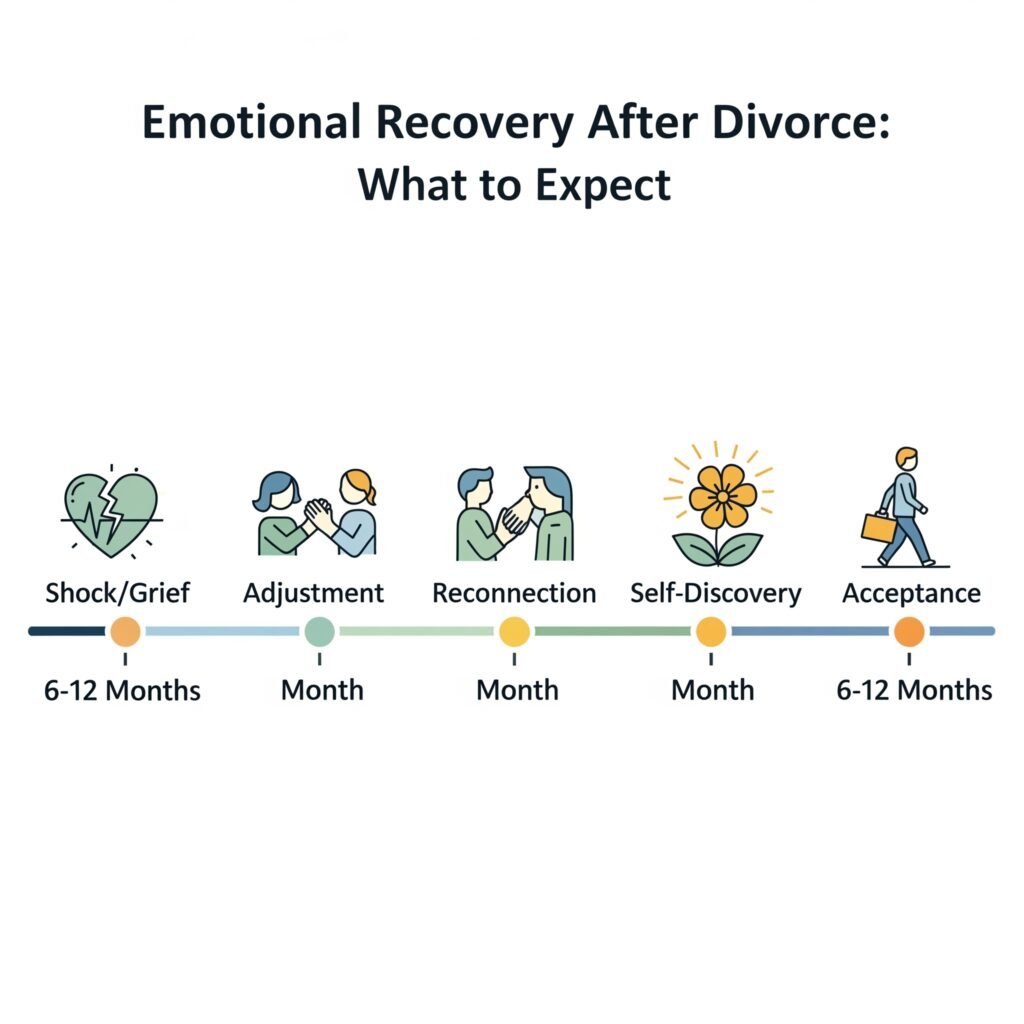Introduction: You are Divorced—Now What?
The legal documents are signed. The court hearings are behind you. But as the dust settles, an unexpected emotion creeps in: loneliness.
You may have thought you would feel free, empowered, or relieved after your divorce—and maybe you do. But many people are surprised by the quiet moments that follow: the silence of an empty home, the absence of daily routine with a partner, the holidays that now feel… different.
If you are struggling with loneliness after divorce, know this: you are not alone. In fact, it’sit is a deeply human part of the healing process. This article explores the emotional aftermath of divorce and offers actionable ways to reconnect with yourself and others, all while reinforcing that it is okay—and necessary—to seek help.
💙 Post-Divorce Loneliness: Quick Overview
Divorce is a profound life transition, often bringing unexpected loneliness even if desired. This is a normal part of healing, stemming from the loss of shared routines and identity. While it can peak within 6-12 months, proactive steps like building routines, reconnecting with relationships, and seeking support are key to recovery. Ziegler Law Group understands this holistic journey, offering not just legal guidance but also referrals to therapists and empathetic support.
Ready to navigate your new chapter with support?
Understanding Loneliness as Part of the Divorce Recovery Journey
Divorce is not just a legal end; it is a life-altering transition. You are adjusting to a new identity, new routines, and often a new reality.
What Loneliness After Divorce Can Feel Like
- A loss of identity or purpose
- A lack of connection to friends or family
- Sadness or anxiety when alone
- Increased irritability or restlessness
🎓 Expert Insight: According to the American Psychological Association, social disconnection post-divorce peaks within the first 6 to 12 months, making early intervention key to long-term recovery.

Emotional Recovery After Divorce: What to Expect
Step 1: Lean Into Healthy Routines and Self-Care
When your emotional world feels out of control, establishing predictable routines can create a sense of safety.
Build Stability Through Small Actions:
- Wake up and sleep at consistent times
- Eat regular, nutritious meals
- Exercise—even a 10-minute walk can help regulate mood
- Journal your thoughts to process emotions
💡 Tip: Use guided meditation apps like Calm or Insight Timer to ground yourself during anxious moments.
🛠️ Actionable Strategies for Healing
- Lean Into Healthy Routines & Self-Care: Build stability with consistent sleep, meals, exercise, and journaling.
- Reconnect with Existing Relationships: Actively reach out to old friends and supportive family members to combat isolation.
- Join Support Groups or Recovery Programs: Find shared experience and understanding in groups like DivorceCare.
- Seek Professional Mental Health Support: Consider therapy if loneliness deepens into depression, anxiety, or prolonged grief.
- Explore New Hobbies & Rediscover Yourself: Embrace personal growth by taking classes, joining groups, or volunteering.
Ready to take the first step towards healing?
Step 2: Reconnect with Existing Relationships
Divorce can sometimes isolate us—not just from our former spouse, but from our community.
Rebuilding Bonds Can Look Like:
- Reaching out to old friends you have lost touch with
- Scheduling weekly calls or coffee with supportive family members
- Joining local meetups or community service events
💬 Real-Life Reflection: “After my divorce, I realized I hadn’t called my sister in six months. Now we talk every Sunday. It’s my favorite hour of the week.”
🔍 Internal Link: How to Support Your Children Emotionally After Divorce
Step 3: Join Support Groups or Divorce Recovery Programs
One of the most powerful antidotes to loneliness is shared experience.
Support Options in New Jersey:
- DivorceCare groups held at local churches and community centers
- Meetup.com groups for single parents or newly divorced adults
- In-person or virtual group therapy through local counseling centers
💡 Tip: Virtual groups are a great first step if you are not ready for face-to-face interaction.
⚠️ When to Seek Professional Help
While loneliness is a normal part of divorce recovery, it can sometimes evolve into more profound issues like **depression, anxiety, or prolonged grief.** If loneliness becomes overwhelming, persistent, or starts to significantly interfere with daily functioning, it’s crucial to seek help from a licensed therapist. Studies show therapy can reduce post-divorce distress by up to 45% within six months.
Need support? Your well-being is paramount.
Step 4: Seek Professional Mental Health Support
Sometimes, loneliness turns into something deeper: depression, anxiety, or prolonged grief. When this happens, a licensed therapist can be a lifeline.
Therapy Helps You:
- Process the loss and grief of the marriage
- Redefine your identity post-divorce
- Set goals for rebuilding emotional connection
🎓 Expert Insight: Studies show therapy can reduce post-divorce distress by up to 45% within six months.
Step 5: Explore New Hobbies and Rediscover Yourself
Divorce gives you something you did not expect: a fresh start.
Personal Growth Opportunities:
- Take a painting, writing, or cooking class
- Join a hiking group, book club, or fitness challenge
- Volunteer at local nonprofits or animal shelters
💬 Reflection Prompt: “What did I set aside during my marriage that I’d love to pick back up now?”
How Ziegler Law Group Supports Clients Beyond the Courtroom
At Ziegler Law Group, we know that divorce does not end with a court order. Our team is committed to helping you navigate life after the legal proceedings—because your emotional health is part of your long-term success.
Our Extended Support Includes:
- Referrals to trusted therapists and divorce coaches
- Post-judgment legal help for custody or support modifications
- Empathetic attorneys who truly understand what you are going through
Schedule a consultation with a compassionate NJ divorce attorney today
❓ New Jersey Divorce FAQs
1. What is “equitable distribution” in New Jersey divorce, and how does it differ from a 50/50 split?
New Jersey follows the principle of equitable distribution. This means that courts aim to divide marital property fairly, taking into account various factors, rather than necessarily equally, recognizing diverse contributions to the marriage.
2. How do New Jersey courts distinguish between “marital property” and “separate property” during a divorce?
Marital property includes assets acquired during the marriage, regardless of who earned them, such as a home purchased together. Separate property consists of assets owned before the marriage or received as inheritances/personal gifts, like an inheritance kept in a separate account.
3. What steps are involved in inventorying assets and debts for divorce in New Jersey?
To estimate what you might keep in a New Jersey divorce, it’s crucial to create a comprehensive list of all assets and debts. Key categories to include are real estate (e.g., residence, vacation property), bank accounts (checking, savings, joint or individual), and retirement/pension plans. Other important categories are vehicles, jewelry, valuable collections, and all outstanding debts.
4. What key factors do New Jersey courts consider when determining a fair division of assets?
New Jersey courts consider numerous factors to ensure an equitable distribution, as every divorce is unique. These factors include the length of the marriage, the age and health of each spouse, their respective income, education, and earning potential, the standard of living enjoyed during the marriage, whether one spouse stayed home to raise children, and custody arrangements (especially as they relate to the marital home). According to NJ Statute § 2A:34-23.1, courts must consider over 15 specific factors, with no single factor automatically outweighs the others.
5. Can an “asset division calculator” accurately predict my divorce outcome in New Jersey?
While there isn’t a single “one-size-fits-all” asset division calculator that can predict your exact outcome, you can conceptually simulate how property might be split by applying New Jersey’s equitable distribution principles to your asset inventory. These conceptual tools help in understanding the factors courts consider. However, due to the complexity and unique nature of each case, no online tool can provide a definitive prediction.
6. Why is legal and professional help crucial for asset division in a New Jersey divorce?
Legal and professional help is essential because only a skilled New Jersey divorce attorney can evaluate all the legal nuances of your specific situation. Certain situations, such as jointly owned businesses, pensions or stock options, real estate with fluctuating value, or hidden/overseas assets, often require professional valuation by appraisers and financial analysts. An attorney can also work with forensic accountants if there’s suspicion of hidden assets, ensuring you receive your fair share.
7. If I have custody of the children, am I guaranteed to keep the marital home?
If a spouse has primary custody of the children, they often have a greater chance of keeping the marital home. This is especially true if retaining the home supports the children’s stability. However, this is not an automatic outcome. You would likely have to buy out your spouse’s interest in the property. The court considers the stability and needs of the children as one of the factors, but the overall financial implications and ability to maintain the home are also important.
8. What happens if my spouse hides assets during the divorce process?
If you suspect your spouse has hidden assets, your attorney can work with forensic accountants to trace and recover the hidden property. This is a critical service as undisclosed assets can significantly impact the fairness of the equitable distribution. Professional legal and financial expertise is vital in uncovering and including all marital assets in the division.
Still have questions about your specific situation?
Conclusion: You are Not Alone—Even If It Feels Like It
Divorce can be isolating, but connection and healing are within reach. By building routines, leaning on relationships, and embracing personal growth, you will begin to fill the emotional gaps—and write a new chapter filled with strength and connection.
🎯 Next Step: Download our Post-Divorce Support Toolkit and connect with Ziegler Law Group for compassionate guidance as you move forward—both legally and emotionally.
📞 Call 973-533-1100 or schedule your consultation online






